ORCID is 3 things or why some researchers instinctively dislike the idea of ORCID

The concept of ORCID (Open Researcher Contributor ID) appears to be simple. The promise is to have a unique identifier for each researcher "the same way books have ISBN" .
As a librarian who has helped researchers pull out citation counts from Scopus, Google Scholar in the past, the idea of ORCID seems elegant and logical.
In the past I had to search for researchers who had names that weren't consistent listed (many Asian names confuse indexers on what their last name really is e.g. yours truly is named Tay Chee Hsien, Aaron) or worse are common (particularly so for researchers from China who have names that are 2 Chinese characters including their family name e.g. Li Bai) without the aid of a proper or complete CV.
Instead of struggling to search with as many variant forms of names you can think of to ensure you cover as much as possible and then puzzling over the result set to see if this work by researcher X that appears in the result set is really the same person you are looking for, the promise of entering a unique universal ID to get everything seems like heaven.
Marketing ORCID
So I'm very happy with the rise of ORCID worldwide in the past few years. Here in Singapore, many institutions including mine are now ORCID members and there is a push to get as many researchers signed up as possible.
Still when I tried to market ORCID to faculty, I noticed a curious amount of pushback. Part of me shrugged it off as natural resistance to change but the more I thought about it the more I realised part of it could be that ORCID itself might have a image issue that puts off researchers.
ORCID is more than just one thing
In my usual overthinking fashion, I started to reflect on what ORCID is actually trying to accomplish and what benefits it claims to provide to researchers. Are these benefits really useful to researchers?
After pondering this and discussing it online for months (thanks Twitter!), I've come to the conclusion that ORCID is actually more than just one thing. It's actually three things and one of those things is I suspect actually causing marketing of ORCID to be harder than it might have been.
I'll decide these three things and the benefits first before discussing how useful they are as a marketing benefit.
1. ORCID is a unique identifier for researcher disambiguation
This is the main reason, we often give when promoting ORCID. I even used that in my introduction. Sometimes I even hear it compared to ISBN and described as "like ISBN but for researchers instead of books".
That sounds nice, but hang on a minute, if you think about how ISBN works vs ORCID it isn't an exact analogy.
For an ISBN, you register your book at a national ISBN Agency that will assign you an ISBN and do some basic cataloguing of the book (at least in Singapore). The equivalent of that for ORCID is a researcher going to ORCID and signing up an account, putting in some personal details about him or herself, kinda of like cataloguing himself or herself.
There's a slight difference here in that unlike the details of a book, details of the researcher such as work place, education etc may change with time. So ORCID would have to allow a login system for researchers (or institutions they give access to) to make changes to their ORCID ID profile when required. But still no biggie right?
But the most interesting difference here from the ISBN analogy is that ORCID encourages you to search for all your works and add it into the profile.
We will come back to this later.
2. ORCID is a way for researchers to authenticate themselves to other systems.
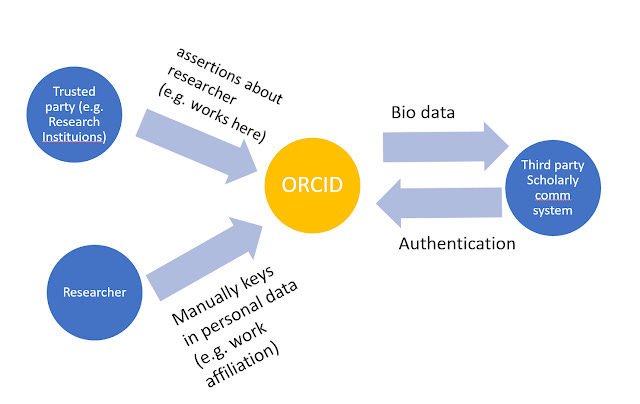
ORCID is populated with personal details (e.g work affiliation) which may be verified by third parties. The account also be used for authentication to other systems and autopopulating of profile data.
We are all familiar with the experience of trying to sign up to a new account and dreading the sign up process. Or we forget the password of some rarely used account. So instead we decide to click on the Google, Facebook, Twitter icon on the login screen and sign on using that instead via the Open authentication protocol .
In fact, you can actually use your Facebook or Google credentials to sign on into ORCID :)
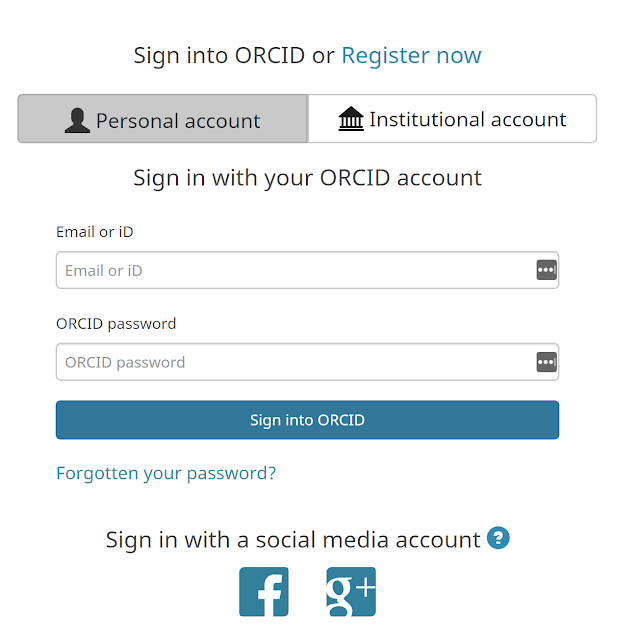
You can sign in to ORCID with social media accounts
But one of the other benefits of ORCID is that it is also positioned to do this for Scholarly communication systems with ORCiD SSO (Single Sign On) feature.
Many diverse platforms like impactstory, Dataverse, ScienceOpen or manuscript submission or editorial sites (e.g. ScholarOne systems used by Emerald, Springer etc), Institutional repositories (such as Dspace), CRIS (Current research information systems) or RIMS (Research Information management systems) such as Elsevier's PURE, Clarivate's Converis and Symplectic Elements all allow or potentially allow you to login with your ORCID account.
ORCID Single Sign On Integration from Aries Systems Corporation on Vimeo.
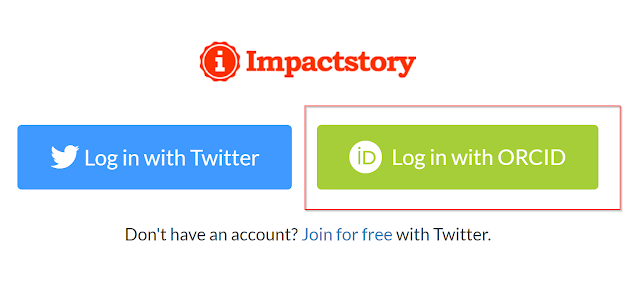
You can login to Impactstory profiles using ORCID
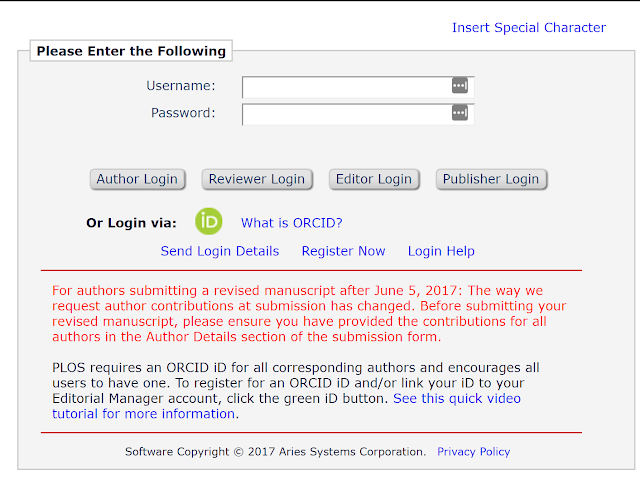
You can login to PLOS editorial manager system using ORCID
Many more such as Arxiv or Mendeley don't seem to have single sign on with ORCID but at the very least links ups with ORCID and syncs biography data or even works (depending on implementations) with ORCID.

You can sync profile data from ORCID to ResearcherID
As this catches on, the ORCID profile would be the default way researchers would authenticate themselves on scholarly platform systems. Just reviewed a paper in a reviewing system? Or just submitted a paper for publication? Show the world it is you by signing it with your ORCID account. The possibilities are endless.
Notice this second benefit enhances and supports the first benefit of name disambiguation (though it's possible to have the first without the second). When submitting papers you don't just have a ORCID field for you to manually enter, you have to sign on to ORCID to prove that you are who you say you are. This help avoids mistakes of course and create a more trusted system.
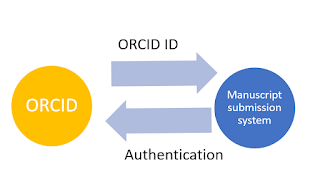
Login to ORCID to add your ORCID number to manuscripts submitted
To further add on, if ORCID is the default trusted ID in the scholarly world, even parts of your profile like where you work (your affiliation), your education , your grants can be verified by other trusted parties (or officially speaking these organizations make assertions on your profile), so it isn't just based on purely what the researcher enters.
Interestingly it also opens up the possibility of logins to ORCID with your institutional login.
And one can imagine all this information can be pushed to other systems including research profile systems such as ResearcherID, similar to how when you sign on to a new account using Facebook, you will usually see your photo nicely imported with some other details passed on from Facebook.
3. ORCID is meant to be central hub for all your works to be pushed out to other systems
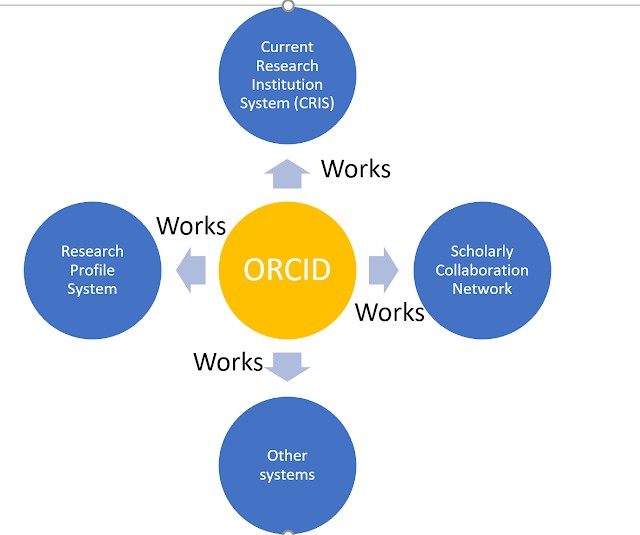
The third purpose of ORCID is where I think it runs into a bit of trouble. In addition to the first two purposes ORCID is also designed to be a central place to pull in all your works. Your ORCID not only proves who you are and includes all relevant personal information about yourself such as education, work experience (some of it verified by trusted organizations), you also include all your works in the profile.
The selling point here is that you aggregate all your works into ORCID once, so you can push out to other systems (primarily research profile systems) and get it all auto-filled without redoing it each time for each new system.
But for this to work, you need to do some additional work upfront. How easy is it to load up all your works into ORCID?
It is getting easy to populate ORCID with your works
In terms of making it easy to populate your ORCID profile with works, ORCID has been nothing short of amazing here. Using the search & Link functionality there is an amazing number of sources you can draw from.
I remember in the early days of ORCID, you could pull in works from your Scopus authorID, Web of Science researcher ID which was nice but at the time neither profiles were particularly widespread despite their early pioneer status.
But today, that's not all you can do. Under the "add works" and "search and link" option you also search and add your works from a bunch of other options. Here's a selected list
You can go into ORICD, link up to these sources, and search for and pull metadata works (by claiming them) from these sources into ORCID.
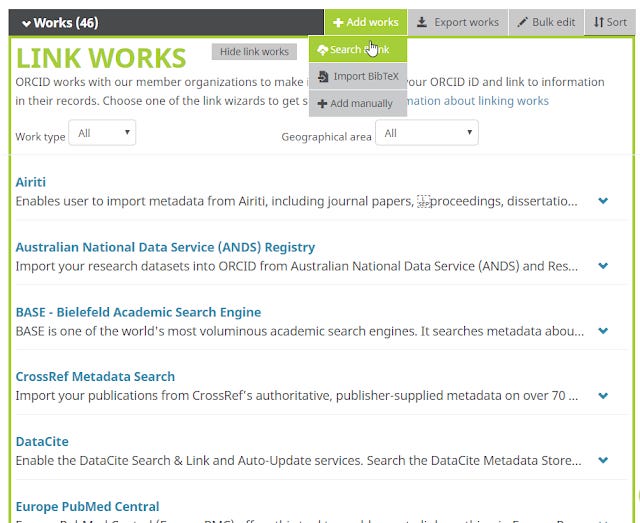
Between Crossref which covers pretty much covers all your conventional published works and Datacite that gets the rest and are popularly used with many data repositories or libraries that mint dois such as figshare , you pretty much don't have to manually type in your works by hand.
But what about preprints/postprints or other non-traditional works?
BASE integration a leading open access repository and probably the leading aggregator of Institutional repositories has you covered there. In fact, as ResearchGate uses doi issued by Datacite, you can probably also pull in them if you generate dois when you upload your work there.
If that wasn't enough, you also use subject specific sources like Airiti (chinese), MLA or PMC Europe.
Or perhaps you are one of the many researchers who love to keep their Google Scholar profiles up-to-date (with or with auto update turned on)? You can export the metadata in BiBTex and export it to ORCID.
Recently universities are starting to implement CRIS (Current research information systems) or RIMS (Research Information management systems) such as Elsevier's PURE, Clarivate's Converis and Symplectic Elements.
Researchers increasingly have incentive or are mandated to fill up these systems with their works (metadata if not full text) for their work to be recognized for assessment purposes. So if you have profiles fully filled up there with your works, you can usually push the same data into ORCID automatically.
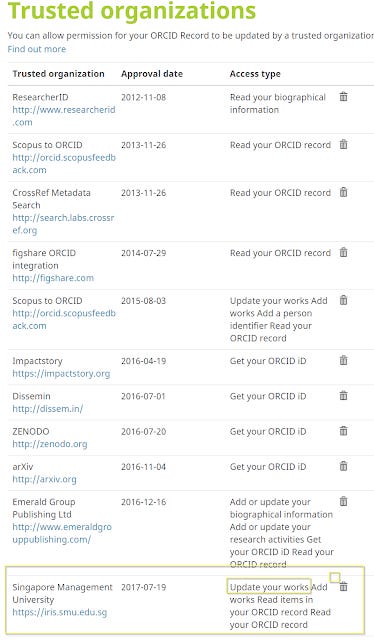
I have given permission for my institution's CRIS system Converis to update ORCID with works
But do researcher's really want to populate ORCID with works?
As you can see, ORCID has wisely made it as easy as possible to populate ORCID with works. Once past the one-time setup, further updates of new works can be automated via crossref (assuming journal publisher supports ORCID which isn't true for most as the time of writing).
Still a mid-level or senior researcher with over 50 works will need to do a bit of the upfront work to update ORCID with his works. If he's lucky he has a fully populated ResearcherID (unlikely unless a librarian did the work) or Google Scholar profile (more likely) and it's a one-time upload. If not, it's going to be still quite costly in terms of time to search each source for works to add.
But even if this is relatively painless, populating ORCID profile with works is not something he inherently wants. What he really wants is for ORCID profiles to push works to the research profiles he cares about, which today is Google Scholar profiles , ResearchGate and perhaps Mendeley.
And this is the part where ORCID currently fails as these systems do not allow you to pull works from ORCID (Mendeley seems to allow only biographic information?).
A bright spot here is that some CRIS (Current research information systems) which arguably some researchers care about, do allow themselves to be autopopulated via ORCID whenever ORCID is updated with new works. This isn't always implemented by the institution of course (may require Premium ORCID membership?).
Do we really need ORCID profile to aggregate works?
I've argued that ORCID has three purposes or benefits
a) name disambiguation / Permanent identifier
b) as a means to authenticate themselves to confirm who they are
c) as a central hub of works that can be pushed to other profiles
If you think carefully about it, you don't actually need to do the third to accomplish the first two. Think back to the analogy of ORCID as ISBN but for researchers. All you need for name disambiguation is just registration a unique string and biographic details of the researcher/book.
To put it another way, If ISBN worked the way ORCID did, "ISBN profiles" would be similar in nature to social reading profiles like Goodreads or Librarything.
Imagine a very different world where ORCID decided to just let Researchers register for IDs by entering some personal details and perhaps allow ORCID to be a sign-on mechanism for other systems without making researchers aggregate all their works.
The advantage of such a system is that it greatly reduces the common problem of researcher's seeing ORCID mainly as "yet another research profile system" and immediately refusing to do it. which arguably isn't the main point compared to name disambiguation.
And worse yet even if you did populate ORCID with works, it's still provides fairly little pay-off for many researchers who only care about populating Google profiles or ResearchGate as these systems cannot be updated by ORCID.
Conclusion
In this post, I have tried to disambiguate the 3 different features of ORCID. My gut feel is that the third feature of ORCID is often discouraging ORCID adoption by researchers because of both the additional work required and the misconception that ORCID is just another research profile system when that's not it's main point.
In theory, ORCID could have the first two functions , that of a unique identifer and that of a authentication token without the need to be a central hub for all works.
In such a world, ORCID would not aggregate works at all. This automatically creates a lower barrier of entry for researchers who need only to sign up and forget about it. They wouldn't have the almost instinctive negative reaction when they think of the work needed to populate ORCID with works when they have already done it for Google or ResearchGate, particularly when it doesn't automatically update the systems they do care about.
In such a world, Crossref and publishers could continue to support ORCID, and research profile systems would continue to pull from such systems (probably via doi registrants like datacite etc) using ORCID.
There will be duplication of work of course with no central hub so you would need to do the same work twice for 2 research profiles that didn't talk to each other, but arguably that's whats currently happening as the big dominant research profile systems refuse to pull from ORCID.
Currently, I think there is a bit of a image problem or confusion with ORCID.
Is it or is it not a research profile system? ORCID seems to suggest it isn't or at least it isn't the only thing particularly when challenged by researchers wary of filling up yet another research profile system, but yet what would you call ORCID when it has all your personal data , works, grants etc listed?
Still I guess ORCID adoption is going to be unstoppable due to the other two benefits once enough systems implement it. In particularly mandating ORCID for journal submission is going to be the magic bullet to ORCID adoption, so my discussion might be moot.
Part of me wonders if under the current system, researchers might start to have ORCID profiles to benefit from the first two purposes of ORCID, but not try too hard to keep their accounts totally up-todate with works because the research profile systems they care about don't yet support it. Of course eventually, if ORCID becomes so dominant, that if a work isn't in your ORCID , it doesn't count this problem will disappear.
Further thoughts
I've so far talked generally about ORCID. But there are still things that puzzles me about it. For instance the question of retrospective assignment of ORCID to works that predate ORCID.
We tell researchers that having an ORCID helps with name disambiguation. Then we ask them to pull in all their works into ORCID. The obvious question which I heard asked is this.
"So I claim works via Scopus , Web of Science, Base etc, into ORCID. Does that mean when other users search by ORCID in these sources (Scopus, Web of Science, Base) the works will appear?"
In other words , is the linking 2 way or one way?
The point here is if all ORCID does is to pull works into ORCID while leaving source systems like Scopus or WOS unchanged, it doesn't help name disambiguation much because who searches ORCID directly? But if such link is two ways, it can get tricky because there is as far as I know no checks built-in and being able to affect very influential indexes this way seems dangerous.
Another aspect is ORCID to consider is the direction of flow of information currently can be in either way. For example some systems when connected to ORCID will pull biographical information from ORCID, while others like Mendeley will actually update biographical information from Mendeley to ORCID. The same holds for works.
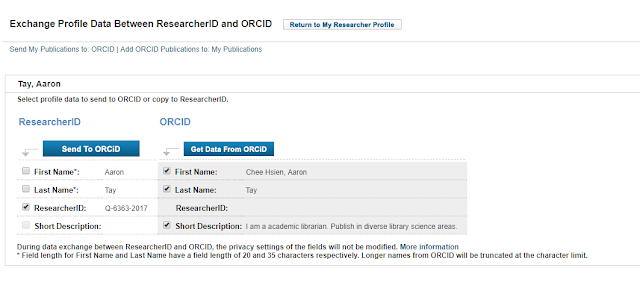
which way should information flow from ORCID to ResearcherID or vice-versa?
This flexibility is good of course, but it leads to many possible workflows that confuses. What is the best workflow? Should information always flow from ORCID outwards to other systems? Particularly in the future where everyone starts from ORCID as the fundamental basic level ?
Additional details
Description
The concept of ORCID (Open Researcher Contributor ID) appears to be simple.
Identifiers
- UUID
- 028b24b3-40a3-417d-8142-5f02f92b9dff
- GUID
- 164998383
- URL
- https://aarontay.substack.com/p/orcid-is-3-things-or-why-some
Dates
- Issued
-
2017-10-08T15:49:00
- Updated
-
2017-10-08T15:49:00


